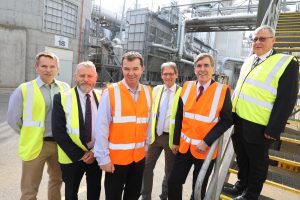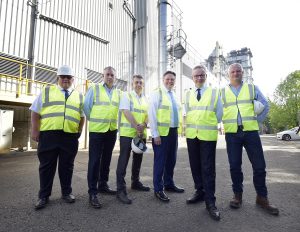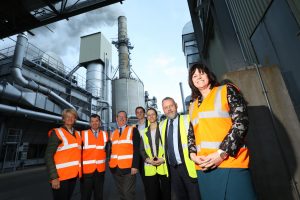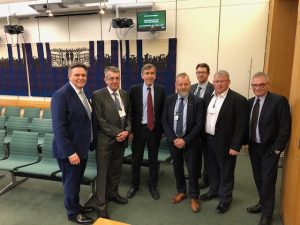(Left to right:- Simon Hart – EGGER Forestry Business Development Manager; John Paterson – Director of EGGER Forestry; Guy Opperman MP for Hexham; Tobias Zimmermann, Plant Director, Technical/ Production, EGGER UK; David Rutley MP, Minister for Food and Animal Welfare; Alastair Kerr – Director General, Wood Panel Industries Federation)
David Rutley MP, Minister for Food and Animal Welfare, with the responsibility for forestry policy in England, visited Northumberland’s largest manufacturing site EGGER (UK) Limited, Hexham on Friday 19th July along with the UK Government’s Tree Champion, Sir William Worsley.
This is the second UK Government Minister to visit EGGER’s Hexham plant this year, with the Minister of State for Energy and Clean Growth, Rt Hon Claire Perry MP visiting in March 2019. These visits followed the publication of the APPG for the Wood Panel Industry’s Expert Working Group Report. David Rutley MP’s visit provides a welcomed recognition of the wood panel industry’s role in supporting a strong forestry policy post-Brexit.
EGGER (UK) Limited has invested a substantial £250 million in UK operations in both Auchinleck and Hexham. This is to ensure it remains at the heart of wood-based materials production within Europe, with now over 800 direct employees. EGGER (UK) Limited’s two manufacturing sites deliver the equivalent of 27,500 lorry trailers of wood-based materials each year.
The Minister used the visit to deliver a welcomed speech to stakeholders on increasing forestry cover in Northumberland and across the nation, highlighting the new Environment Bill and forthcoming Tree Strategy as the UK Government’s latest commitment to bolstering tree planting in England.
Forestry Minister David Rutley MP said: “There is no doubt that forestry is a vital industry in Northumberland, and my visit to Egger’s impressive Hexham plant only confirmed this.
“I believe passionately that tree planting must be at the heart of our plans as a government. I look forward to continuing discussions with Egger and other stakeholders in the forestry sector on how we can work together in partnership to achieve our ambitious goals.”
John Paterson, Director, EGGER Forestry commented: “We were delighted to have the Minister visit our plant where we were able to show him the manufacturing process and range of panel-based products produced in Hexham. Northumberland is a fantastic location for afforestation and we look forward to further discussion on the future of large-scale planting opportunities. EGGER makes a considerable contribution to both the local and national economy and as a company we are encouraged by the initial steps taken recently in terms of woodland creation targets which will be a key component for promoting confidence for this domestic industry in the years ahead.”
Alastair Kerr, Director General of the Wood Panel Industries Federation (WPIF) added: “We were pleased to continue the constructive conversation with the Minister on the challenges facing our industry as a whole. The principal issue facing the industry is wood security and constraint upon long-term supply limits its growth potential. Future forestry policy needs to detail key planting targets for the next twenty years, which will prove a crucial time for the wood panel industry. We look forward to further discussion on this and energy policy in order to secure the long-term future of this critical domestic industry.”
Guy Opperman, MP for Hexham said: “It was fantastic to have David Rutley MP, the DEFRA Minister, visit Egger in Hexham. It was an incredibly productive meeting with representatives from across the Forestry sector. He will have left the event in no doubt that we want more forestry in Northumberland, which will not only result in more forestry sector jobs but will also build us a better environment.”





